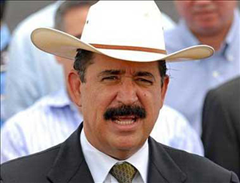
*This article was changed on August 12, 2009, removing inaccurate references to Export Development Canada.
For the first time in decades, the world's eyes are on Honduras, a tiny country many Canadians know for those little stickers on exported bananas and the surplus of coffee it floods onto the global market each year. The world is less aware of the ongoing role that the Canadian government and Canadian mining companies play in pushing many Hondurans further into poverty.
Now that the world is watching, it's a good time to reveal these secrets.
On Saturday, July 4, at the impromptu meeting of the Organization of the American States, Canadian Minister of State of Foreign Affairs for the Americas Peter Kent suggested President Jose Manuel "Mel" Zelaya not return to Honduras. It's an interesting stance for Canada to assume, considering that most of the international community has condemned the coup in Honduras.
Moreover, following violent clashes between the military police and demonstrators awaiting Zelaya's return this past Sunday, Kent held Zelaya responsible for the deaths of two demonstrators by the military government.
Prior to these comments, Canada had remained relatively silent on this issue. But while most other counties have cancelled their aid to Honduras in protest of the coup, Canada has not. Why is our democracy suddenly in the business of supporting a military coup?
Capitalizing on hurricane devastation
The answer begins with Canada's reaction to the last crisis in Honduras.
In 1998, Hurricane Mitch swept through much of Central America and especially ravaged Honduras, where thousands of people were killed and millions were displaced. Already the second poorest country in the Western Hemisphere, Honduras was now struck with over $3 billion in damages, a loss of social services such as schools, hospitals and road systems. Seventy per cent of its agricultural crops were destroyed. Nothing so devastating had ever hit Honduras.
Canada was quick to respond to the cries for help following Hurricane Mitch, with a 'long-term development plan'. Canada offered $100 million over four years for reconstruction projects. These grandiose aid packages made Canada look like a savior. However, attached to this assistance was the introduction of over 40 Canadian companies to Honduras to assess opportunities for investment. This hurricane offered a strategic economic opportunity for Canadian investment in Honduras.
The Canadian government, as it officially stated this year, considers mineral extraction by Canadian mining companies one of the best ways to "create new economic opportunities in the developing world". Shortly after Hurricane Mitch weakened the Honduran state, Canada and the United States joined to establish the National Association of Metal Mining of Honduras (ANAMINH), through which they were able to rewrite the General Mining Law. This law provides foreign mining companies with lifelong concessions, tax breaks and subsurface land rights for "rational resource exploitation".
'We have lost everything'
"They crave gold like hungry swine," Uruguayan journalist Eduardo Galeano has written of multinational mining firms. I thought of those words on a recent drive through the open pit San Andres mining project, recently sold by the Canadian company Yamana Gold to another Canadian company, Aura Minerales. When I'd finished my tour, I was convinced the social, economic, environmental and health costs of open pit mining practices far outweigh the supposed benefits, and that the resource exploitation practiced by certain Canadian companies is anything but rational.
I got chills driving through the abandoned village of San Andres. What were once homes and schools had been bulldozed into mounds of crushed adobe and rock. Where ancient pine trees stood, there now were deep craters, accessible by the nicest highways I had seen in Honduras.
But a local resident at the end of one of those roads told me: "We have lost everything." The mine had displaced him from his home, and he was now without clean water to drink or fertile land to sow. *
In February 2003, nearly five hundred gallons of cyanide spilled into the Rio Lara, killing 18,000 fish. The mine in San Andres uses more water in one hour than an average Honduran family uses in one year. In that same year, mining companies earned $44.4 million, while the average income per capita in Honduras in 2004 was just $1,126USD.
Zelaya's anti-mining stance: payment due
As the man at the end of the road tried to explain to me, mining is not development for people who live around these mines. He speaks for thousands of others -- a base of support aligned with the ousted President Zelaya. In 2006, Zelaya decided to cancel all future mining concessions in Honduras.
Which would appear to explain, at least in large part, why Canada stands virtually alone in the hemisphere in supporting the Honduran military's ousting of Zelaya. The Canadian government, and its friends in the mining industry, are using the coup as an opportunity to plant their feet deeper into the Honduran ground.
In his role as minister of state for foreign affairs, Peter Kent once declared that "democratic governance is a central pillar of Canada's enhanced engagement in the Americas."
Apparently, his instructions from Ottawa have been revised.
Related Tyee stories:
- Letter from Honduras
After the coup, a Canadian student visits a scene of resistance. - Canadian Mining Firm Financed Violence in Ecuador: Lawsuit
TMX Group denies claim. Win could affect thousands of other projects by Canadian companies. - Mining Gold, and Outrage, in Guatemala
Vancouver-registered firm pushes big project.
Read more: Rights + Justice, Politics















Tyee Commenting Guidelines
Comments that violate guidelines risk being deleted, and violations may result in a temporary or permanent user ban. Maintain the spirit of good conversation to stay in the discussion.
*Please note The Tyee is not a forum for spreading misinformation about COVID-19, denying its existence or minimizing its risk to public health.
Do:
Do not: